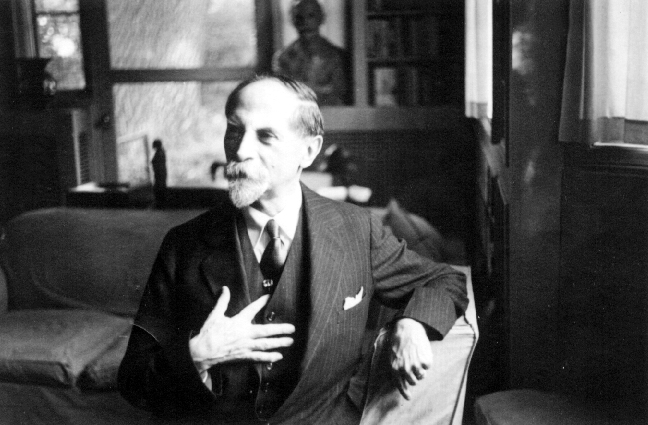<Back to Index>
- Psychiatrist Adolf Meyer, 1866
- Composer Arnold Schoenberg, 1874
- United States General of the Armies John Joseph "Black Jack" Pershing, 1860
PAGE SPONSOR

Adolf Meyer, M.D., LL.D., (September 13, 1866 in Niederweningen, near Zurich, Switzerland - March 17, 1950), was a Swiss psychiatrist who rose to prominence as the president of the American Psychiatric Association and was one of the most influential figures in psychiatry in the first half of the twentieth century. His focus on collecting detailed case histories on patients is the most prominent of his contributions; along with his insistence that patients could best be understood through consideration of their life situations.
Meyer received his M.D. from the University of Zürich after studying psychiatry with Auguste Forel and neuropathology with Constantin von Monakow, and subsequently began his professional career as a neuropathologist. Unable to secure an appointment with the university, he emigrated to the U.S. in 1892, at first practicing neurology and teaching at the University of Chicago, where he was exposed to the ideas of the Chicago functionalists. From 1893 to 1895 he served as pathologist at the new mental hospital at Kankakee, Illinois, after which he worked at the state hospital at Worcester, Massachusetts, all the while publishing papers prolifically in neurology, neuropathology, and psychiatry. In 1902 he became director of the Pathological Institute of the New York State Hospital system (shortly afterwards given its present name, The Psychiatric Institute), where in the next few years he shaped much of American psychiatry by emphasizing the importance of keeping detailed patient records and by introducing both Emil Kraepelin's classificatory system and Sigmund Freud's ideas. While in the New York State Hospital system Meyer adopted Freud's ideas about the importance both of sexuality and of the formative influence of early rearing on the adult personality. Meyer was Professor of Psychiatry first at Cornell University from 1904 to 1909 and from 1910 to 1941 at Johns Hopkins University, where he was also Director of the Henry Phipps Psychiatric Clinic from its inception in 1913. Henry Phipps Psychiatric Service at Johns Hopkins Hospital, which in 1912 made possible the first inpatient facility in the United States for the mentally ill, was constructed as part of an acute care hospital. While he served as the director of the psychiatric department at Johns Hopkins, the first academical child psychiatry department in the world was founded by Leo Kanner in 1930 under Meyer's direction.
His principal contributions were through his ideas of psychobiology (or alternatively, ergasiology, a term he coined from the Greek words for working and doing), by which Meyer designated an approach to psychiatric patients that embraced researching and noting all biological, psychological, and social factors relevant to a case — thus his emphasis on collecting detailed case histories for patients, paying particular attention to the social and environmental background to a patient's upbringing. Meyer believed that mental illness results from personality dysfunction, rather than brain pathology. His later teachings resisted some of the ideas of Sigmund Freud, which Meyer thought placed too much emphasis on factors that were tangential to the functional needs of patients in their everyday lives. Though Meyer's own system of nomenclature never caught on, his ideas, especially those emphasizing the importance of social factors, and his insistence on understanding the life of the patient through careful interviewing, did exert some influence but perhaps remain largely unappreciated in the history of American psychiatry. Adolph Meyer is also considered a significant early supporter of occupational therapy. He believed that there was a critical link between an individual's activities and activity patterns and his or her physical and mental health. In his vision for the mental hygiene movement, he advocated for community based services to help people develop skills to cope with the demands of everyday living.
It was Meyer who suggested the term mental hygiene to Clifford Beers, after which Beers founded, with the support of Meyer and William James, the Connecticut Society for Mental Hygiene (1908) and the National Committee for Mental Hygiene (1909). Meyer
wrote no books; his pervasive influence on American psychiatry stemmed
instead from his numerous published papers, his prestige, and his
students, both at Manhattan State and, especially, at Johns Hopkins.
Many of his students went on to make significant contributions to
American psychiatry or psychoanalysis, though not necessarily as
Meyerians. Always eclectic and willing to absorb ideas from whatever
sources he found relevant, Meyer never formed his own discrete school
of thought with disciples. Most of the founders of the New York Psychoanalytic Society had worked under Meyer at Manhattan State Hospital, including its chief architect Abraham Arden Brill.
Though Meyer found Freud's ideas interesting, he never practiced
psychoanalysis and increasingly distanced himself from it as the years
went on. As he wrote in his presidential address to the 84th Annual
Meeting of the American Psychiatric Association:
"Those who imagine that all psychiatry and psychopathology and therapy
have to resolve themselves into a smattering of claims and hypotheses
of psychoanalysis and that they stand or fall with one's feelings about
psychoanalysis, are equally misguided" [page 18 in the Collected Papers, volume II, originally published in the American Journal of Psychiatry,
LXXXV, 1928, 1-31]. This address, "Thirty-Five Years of Psychiatry in
the United States and Our Present Outlook" gives Meyer's own account of
American psychiatry during the time when he himself was important in
helping to shape it. Meyer
was a strong believer in the importance of empiricism, and advocated
repeatedly for a scientific approach to understanding mental illness.
Meyer introduced the possibility of infections (then viewed as the
cutting edge concept of scientific medicine) being a biological cause
of behavioral abnormalities, in contrast to eugenic theories that
emphasized heredity and to Freud's theories of childhood traumas.
Meyer's work was greatly influenced by Charles Sanders Peirce, William James, and John Dewey.